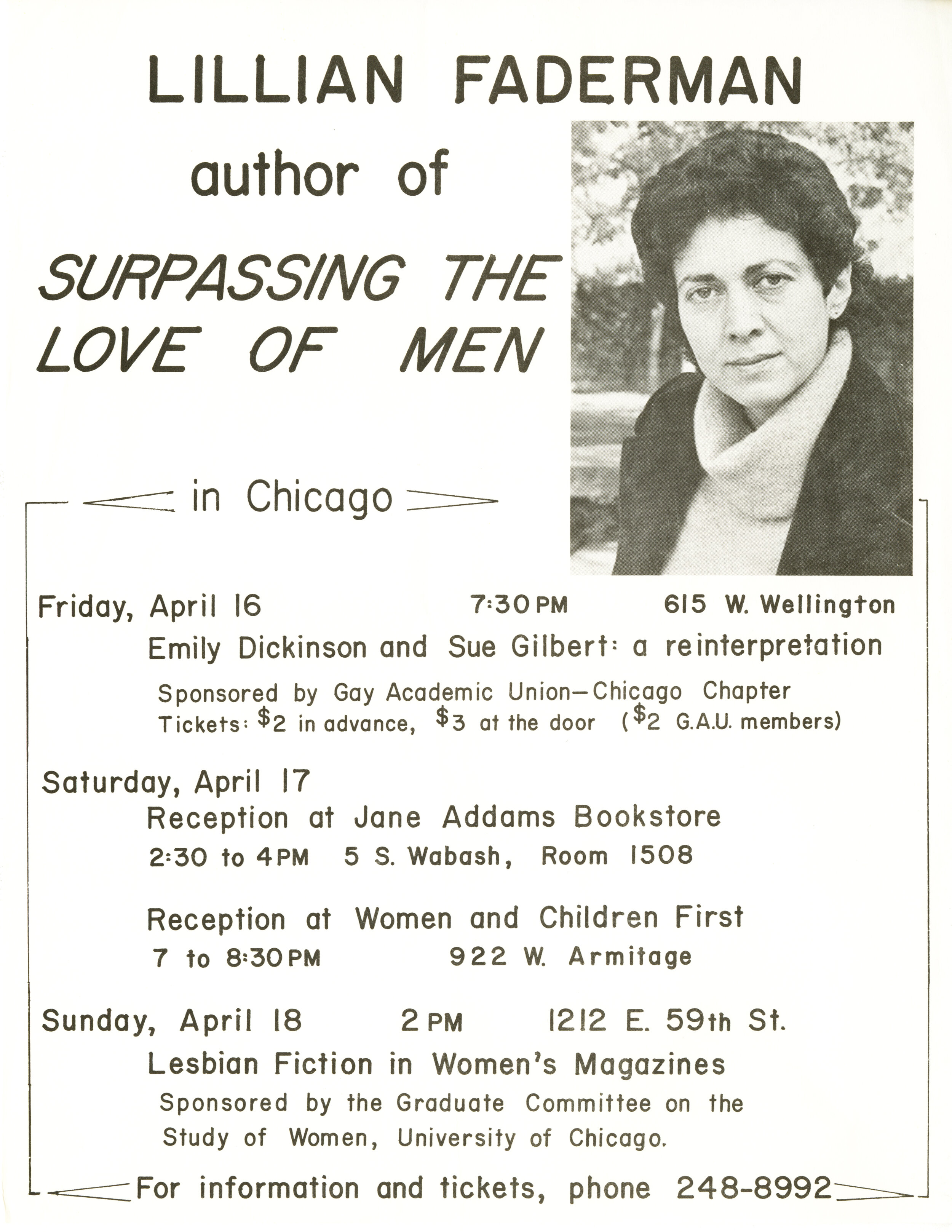Lillian Faderman Papers
Full finding aid and list of materials
Lillian Faderman’s materials have been processed in two parts.
The first collection of materials was processed between 2007-2008 and is located in UCLA's Special Collections as part of their relationship with the Mazer. In addition, a shortened finding aid based on this collection was created by a UCLA student receiving their Masters in Library Science.
Read the UCLA Special Collections’ finding aid for the Lillian Faderman Papers.
The second collection was processed from 2023-2024 as part of a California State Grant awarded to the Mazer in 2020. It is currently located at the Mazer.
Read the finding aid for the Lillian Faderman Collection processed in 2023-2024.
An efficient way to search for specific materials within these finding aids is to use Ctrl+f (Windows computer) or Command+f (on a Mac).
Biography
Lillian Faderman is an internationally-known literary scholar and historian of lesbian history. She has published nine books and numerous articles on lesbian history, literature and criticism, including Surpassing the Love of Men (1981), an acclaimed study of five centuries of love between women, and Odd Girls and Twilight Lovers (1991), a history of twentieth-century lesbians in America, which were both named among The New York Times notable books of the year; her memoir, Naked in the Promised Land (2003) and her latest book, Gay L.A. (2006), which she co-authored with Stuart Timmons.
Faderman's work has centered on establishing a lesbian tradition, on what she calls a "usable past." In her early works, especially in Surpassing the Love of Men and Odd Girls and Twilight Lovers, she showed that so-called romantic friendships between women were considered neither abnormal nor undesirable in prior centuries. Accordingly, women who loved women in the past were not always made to live like outlaws. Only after 1980, in the aftermath of sexology, did same-sex love between women come to be seen as suspect, degenerate or even criminal. Faderman has also written on the theme of same-sex love and romantic friendship in poems and letters of Emily Dickenson; in novels by Henry James, Oliver Wendell Holmes, and Henry Wadsworth Longfellow and in popular magazine fiction of the early twentieth century.
Faderman's later book, To Believe in Woman: What Lesbians Have Done for America–A History (1999) is the culmination of her two previous books, Surpassing the Love of Men and Odd Girls and Twilight Lovers. It charts romantic friendships between women and lesbian love through some of the most important social movements in the U.S. and shows how these same-sex partnerships made major feminist causes of the nineteenth and early twentieth centuries possible.
Faderman's other major books, each groundbreaking when it was published, are Lesbians in Germany (1980), her first work in lesbian history; Scotch Verdict (1983), which chronicles the 1810 trial of two Scottish schoolteachers accused of lesbianism; Chloe Plus Olivia (1994), an anthology of lesbian literature since the seventeenth century and I Begin My Life All Over: The Hmong and the American Immigrant Experience (1998), which records the story of 36 Hmong immigrants to California. Her articles on lesbian life and literature have appeared in diverse academic, feminist and lesbian journals, including The New England Quarterly, The Massachusetts Review, Journal of Popular Culture, Higginson Journal, Journal of Homosexuality, Signs, Conditions and Gay Books Bibliography.
Faderman was born July 18, 1940 in the Bronx, New York, the daughter of a single working mother who lost most of her family in the Holocaust. Throughout her childhood, Faderman's dream was to become a movie star. Faderman's family moved to east L.A. when she was a teen and she later attended U.C. Berkeley, where she worked as a burlesque stripper to support herself. She received a B.A. in English literature from U.C. Berkeley in 1962, an M.A. in English from UCLA in 1964, and a Ph.D. in English from UCLA in 1967. In 1967, Faderman started teaching in the English department at California State University, Fresno, where she began her career co-editing two anthologies of American multi-ethnic literature: Speaking for Ourselves: American Ethnic Writing (1969; 1975) and From the Barrio: A Chicano Anthology (1973).
Faderman served in various administrative positions (1971-1976) at California State University, Fresno, including Chair of the English Department, Acting Dean of the School of Humanities and Assistant Vice President for Academic Affairs and then decided she preferred teaching and writing. Faderman, along with Phyllis Irwin, helped establish the first women's study program at California State University, Fresno in 1972. She was promoted to full Professor of English in 1973. Irwin later became her domestic partner of 40 years. They have one child: Avrom (1975- ).
Throughout her career, Faderman has been sought after as a speaker, teacher, critic, and visiting lecturer. Faderman has been a frequent speaker at lesbian and feminist organizations, universities, and lesbian, gay and women's organizations nationally and internationally, including the Modern Language Association (MLA), the National Women's Studies Association (NWSA), GAU (Gay Academic Union) and the Berkshire Women's History Conference.
Faderman's work has been translated into numerous languages, including German, Spanish, Italian, Japanese, Turkish, Czech, and Slovenian. Among her many honors are six Lambda Literary Awards, two American Library Association Awards, and several lifetime achievement awards for scholarship, including Yale University's James Brudner Award, the Monette/Horwitz Award, the Publishing Triangle Award, the ONE National Gay and Lesbian Archives Culture Hero Award, and the American Association of University Women's Distinguished Senior Scholar Award. She divides her time between Fresno and San Diego.

